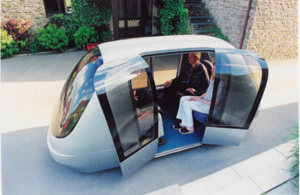Motorway services and large petrol retailers will be required to install chargepoints for electric cars, under plans has been announced by Transport Minister John Hayes.
 The Automated and Electric Vehicles Bill will increase the access and availability of chargepoints for electric cars, while also giving the Government powers to make it compulsory for chargepoints to be installed across the country and enabling drivers of automated cars to be insured on UK roads.
The Automated and Electric Vehicles Bill will increase the access and availability of chargepoints for electric cars, while also giving the Government powers to make it compulsory for chargepoints to be installed across the country and enabling drivers of automated cars to be insured on UK roads.
Automated vehicles have the potential to greatly reduce road traffic accidents – in 2016 85.9% of collisions causing injury involved human error, while official research estimates that the market will be worth £50 billion to the UK economy by 2035. Automated vehicles can regulate the speed at which they travel and do not make human errors.
Transport Minister John Hayes said: “We want the UK to be the best place in the world to do business as a leading hub for modern transport technology; that is why we are introducing the Automated and Electric Vehicles Bill in Parliament and investing more than £1.2 billion in the industry.
“This Bill will aid the construction of greater infrastructure to support the growing demand for automated and electric vehicles as we embrace this technology and shape the future.”
Drivers of electric vehicles will be able to easily locate and charge at any chargepoint, using information from sat navs or mobile apps, regardless of the vehicle make or model – making running an electric vehicle even easier. All chargepoints will have to be ‘smart’, meaning they can interact with the grid in order to manage demand for electricity across the country.
Jesse Norman will also announce further funding for local authorities at the Smarter Travel Conference in Milton Keynes on Thursday to fund install chargepoints in residential areas where cars are parked on the street.
Steve Gooding, Director of the RAC Foundation said: “We are pleased to see the provisions of the Automated and Electric Vehicles Bill re-starting their passage through the Parliamentary process”
“It is clear that Government needs to do more to accelerate the take-up of electric vehicles, tackling the issues that are currently persuading motorists to sick with conventional fuels, as well as paving the way for autonomy”
“The test, though, will be how effectively those powers are exercised”
All drivers of automated vehicles will be required to be insured and victims of collisions involving an automated vehicle will have quick and easy access to compensation, in line with existing insurance practices.
James Dalton, ABI: “Insurers wholeheartedly support the development of automated vehicles, as they have the potential to significantly reduce the large number of road accidents caused by driver error. We support the approach the Government has taken in the Bill, as this will give the industry time to prepare for the commercial rollout of fully automated driving technology.”
Mike Hawes, SMMT Chief Executive, said: “The UK is a world leader in the electric vehicle market and a hotbed of innovation for connected and autonomous vehicles. We welcome government’s commitment to create the conditions necessary to position the UK as a centre of excellence for the development and rollout of these technologies.
Increasing and improving the recharging infrastructure is a vital step for the growth of the electric vehicles, and boosting buyer confidence will be essential to increasing up-take. Although fully self-driving cars are still some way off, today’s Automated and Electric Vehicles Bill will be key to ensuring the UK can be among the first to grasp the benefits of this exciting new technology – as well as giving motorists peace of mind that, in the unlikely event of any issue, they will be covered.”
The bill has received its First Reading in the House of Commons.
Kindly follow us on twitter:@AfricanVoice2












